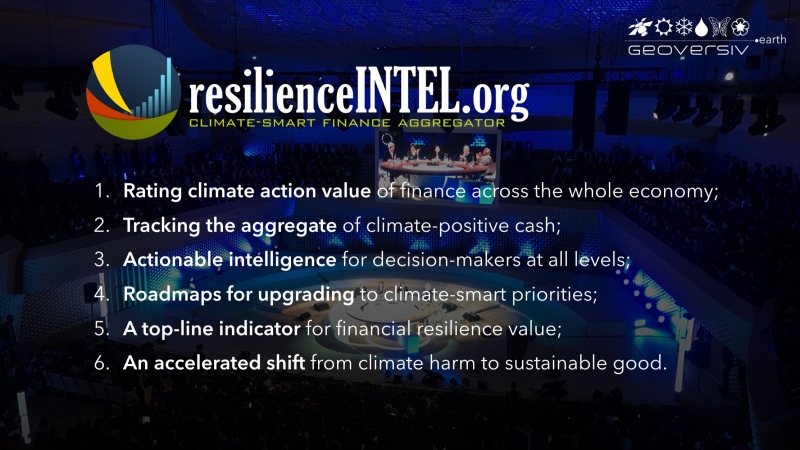Making climate intelligence the operational standard for all finance and spending, at all levels.
- Answering: Where do we want to go?
- Objective: To make all finance everywhere 100% climate-smart within 20 years.
- Submitted by the Resilience Intel coordinating team to the Talanoa Dialogue Preparatory Phase, Spring 2018 Cycle
- URL: resilienceintel.org/ambition
Background
Resilience Intel is a coalition effort to track, grade, aggregate, and upgrade, climate-smart spending across the whole economy. Its creation was supported by the COP22 Presidency in support of its climate finance work. Resilience Intel is also the main work-product of the Acceleration Dialogues — a series of high-level climate and energy working sessions co-convened by Citizens’ Climate Education and the International Center for Dialogue and Peacebuilding, in collaboration with the Norwegian Nobel Institute.
This coalition input to the Talanoa Dialogue Preparatory Phase focuses primarily on the guiding question Where do we want to go?
What kind of financial system do we want in 20 years?
No nation can afford for climate disruption to continue unabated. So, there is a natural alignment of interest between the major policy and investment planning of the most industrialized and most vulnerable countries. A smart, rapid, economy-wide transition to climate-smart priorities and practices can bridge old divides, and build up a new base of enduring inclusive prosperity.
The whole financial system of the world can, and should, evolve to eliminate unilateral imposing of cost and risk onto third parties.
Within 20 years (by 2038), the global community of nations, through smart policy and financial sector transformation, should be able to arrive at a new standard where economy-wide resilience intelligence is the aim of all finance in the public and private sectors.
Shorthand for this new standard is ACCESS — an aspirational collaboration on climate, energy, sustenance, and security. Through a process of ongoing consultation, through the Citizens’ Climate Engagement Network, the Acceleration Dialogues, and other discussions, we have crafted guidance for ministers to act on immediately, to efficiently leverage macro-critical drivers of long-term health and resilience.
This transition to economy-wide resilience intelligence as standard operating procedure, and adoption of the ACCESS standard must integrate with locally rooted action on all 17 of the Sustainable Development Goals. Climate-smart finance will be higher performing for all stakeholders when its focused climate action value also achieves forward progress on one or more of the non-climate SDGs.

Commitments and Actions
Dialogues: We commit to organize (and will support others in doing so as well) an ongoing program of multilevel multilateral dialogues, similar to and continuing the work of:
- Marrakech: Accelerating NDC Action
- Paris: Co-Creating Resilience Intel
- Washington, DC: Toward Economy-wide Resilience Intelligence
Commitments: We urge leaders in government and outside of government to work with partners to support multistakeholder design and implementation of action-focused commitments, such as:
- The Marrakech Pledge for Greening African Capital Markets
- The One Planet Summit’s transformational commitments and ongoing coalition effort
- The Green Bond Pledge, to expand the market for sustainable finance
Pathway partnerships: In support of the necessarily fast-paced process of shared exploration and discovery required to drive a transition to full-spectrum sustainable finance, we encourage Parties and non-Party stakeholders to drive action through partnerships, such as:
- The Carbon Pricing Leadership Coalition
- The Climate Action Peer Exchange
- The Ocean Neutrality Initiative
Technology: We encourage and will support development and deployment of technologies to ensure climate-smart finance-related information flows are rooted in local need and knowledge, inclusive in design and end-use, and applicable to decision-making at all levels, via:
- An all-systems multi-scale resilience intelligence engine, integrating observational science
- Distributed ledger technologies, intended to reduce fraud, increase transparency and ensure stakeholder participation in climate solutions
- Locally-rooted services and technology to enhance overall climate intelligence
Positive outcomes
We envision a world in which major investments rule out the routine generation of secondary harm and risk. By counting the climate-action value of any spending in any area, we can widen the pool of total catalyzed climate-related finance and investment, maximize the overall climate intelligence of community-level, institutional and national planning, and connect Earth systems data to new opportunities in sustainable farming, climate-friendly innovations, and the ongoing development of the blue economy.
This submission is a background note regarding both a coalition effort to build resilience intelligence in many interrelated fields and new ways Parties and non-Party stakeholders can adapt their local priorities and actions to ensure we meet the long-term goal of a 100% climate-smart financial sector, within 20 years. We will convene (and support others in convening) a series of Talanoa Dialogue events throughout 2018 and provide a more detailed action-specific submission for consideration by ministers and negotiators during the high-level meetings at the COP24.
Supporting Stakeholders
- AMMC (The Moroccan Capital Markets Authority)
- Citizens’ Climate Education
- The Finance Professionals Society for Climate Resilience in Africa
- The Geoversiv Foundation
- The International Center for Dialogue and Peacebuilding
- The Resilience Intel coordinating team
For follow-up, contact Joseph Robertson, Global Strategy Director for CCE and CCL, at jr(at)citizensclimate.org
Check ResilienceIntel.org regularly for updates on Resilience Intel working dialogues, progress toward a cross-platform multi-scale core methodology, and an all-systems climate-smart information service.

